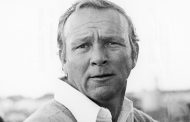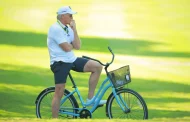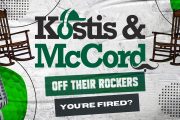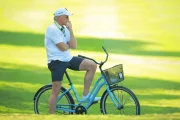Back in May, you probably read the confusing headline that Jack Nicklaus is being sued by the Jack Nicklaus Companies.
That’s not really the case. Truth of the matter is that it is one Howard Milstein suing golf legend Jack Nicklaus because Jack no longer has one iota of control over the “Jack Nicklaus Companies” — and he may not even have any remaining ownership.
Howard Milstein, the slick New York financier who has a law degree AND an MBA from Harvard, is waging a legal war against Jack, who never graduated from Ohio State University.
To gain some understanding of what went wrong with this, we need to go back to 2007 to set the table.
Jack was looking to do some estate planning — basically wanted to pass some serious money to his five children. A third party evaluated the Nicklaus Companies at $296 million. Word went out that Jack was looking for an entity to buy 49 percent of the company — asking price was $145 million.
There were several suitors but the only full offer came from a man known to Jack — Howard Milstein.
Now here’s where things started to go wrong and it should have been a total red flag. Milstein’s offer, the funds to Nicklaus, would come not in the form of equity, but in the form of a $145 million loan from Emigrant Bank in New York. The bank is owned and controlled by Milstein. The proposed “loan” to the company came with a hefty 8.5 percent interest factor — which was about standard in 2007 when the transaction was proposed.
What Nicklaus didn’t have was a high-power law firm with multiple partners experienced in the world of business contracts. His lawyer was family friend Jim Schnare.
Nicklaus also should have posed important questions: What is the downside? Is it possible to lose control of my company? What happens if there’s not enough income in the venture to service the loan interest? And that interest alone is $12,325,000 per year. And loans have to be repaid. If it had been pure, unleveraged equity, Jack would have been a lot safer. But he wasn’t.
Included in the transaction was Nicklaus’ golf course design business, the rights to his name and all the company’s trademarks along with the money and rights to his endorsement deals. In other words, Jack was signing almost half of his life away.
Unfortunately Nicklaus didn’t ask the questions about possibly losing control. He no doubt signed the “loan documents” and you don’t want to see how many pages there can be in the documents governing a $145 million loan. Not long after the deal was signed and money transferred in 2007, the economy shifted into what was eventually became the Great Recession.
There wasn’t enough money to pay the interest. Additional financing came and with it, control of the company shifted from Nicklaus to Milstein. Jack had no idea of the nightmare that was beginning.
Below are excerpts from Nicklaus’ deposition given during the discovery process of the lawsuit, Jack’s words are in italics:
“I am not a lawyer. I would think that, once my non-compete expired, I should be able to use my given name and the face that I have to do things that the non-compete previously prohibited. Howard claims otherwise, but no one communicated that to me back in May 2007 or the years that followed. From time to time, I would ask Jim Schnare what my rights and obligations would be if I left the Company, and he certainly didn’t tell me that I would never again be able use my name for design work or endorsements. Now that he is on the other side, however, he appears to be saying that he gave my life away. I don’t know how he can be claiming that, as it wasn’t my understanding when he was representing me. I know that GBI gave the intellectual property it had to the Company, and I know any intellectual property I developed as an employee of the Company belongs to the Company, but I certainly did not believe the Company would own me forever
or could prevent me from using the name and likeness my parents gave me forever. That seems ridiculous to me.”
No doubt Nicklaus felt betrayed by his own lawyer, Schnare.
The Market Collapse:
“In late 2007, the real estate markets collapsed, which had a negative impact on the Company’s core businesses. The Company’s revenues dropped over the next few years, and it didn’t have enough net income to meet debt service on the Emigrant loan. Each time a payment could not be made, a PIK (Payment In Kind) was issued which added to the total amount due, and the total interest owed each month increased. When the recession neared its end, Howard took control of the Company and became responsible for returning our business to the level of success we had
achieved before the transaction with Emigrant Bank. He didn’t accomplish that. Instead, he drove the Company further into decline, with practices that did not work in our lines of business. His focus was not on the Company but on improving his reputation. He wanted to improve his by association with me, but it didn’t work. In the meantime, my family’s interest disappeared as the amount owed to Emigrant skyrocketed, and I went from master of my own fate to an employee of someone who didn’t understand the business I was employed in.”
The loan took its toll. It should never have happened, Jack’s counsel should have warned him but didn’t.
The Relationship Between Nicklaus And Milstein Becomes Contentious:
“It did. Once Howard had permanent control of the Company, he acted as if he owned me. He tried to control every aspect of my life, from what I did, to whom I spoke with, to where I went, as if I was his property. I always tried to be respectful, but there was no respect in return. I also tried very hard to make the relationship work, but it became increasingly obvious that I had aligned myself with a person who didn’t respect me as a human being.”
Milstein Refuses Buyout Offer:
“I did bring that up with Howard. I think it was in late 2016 or early 2017. I told Howard that I wanted the opportunity to raise the money needed to repay the $145 million loan and buy him out of the Company. With the roughly $80 million in interest that had been paid to Emigrant by that point, it would have represented a reasonable return on a 10-year investment during a period that included a recession. Unfortunately, Howard said he was not interested in being bought out and refused to bring the proposal to the Board for consideration.”
Jack Never Saw It Coming Early On:
Deposition Question: The Company’s lawsuit claims that the Company and Emigrant bought your businesses for $145 million. Is that a fair characterization?
“That was not how the deal was supposed to work, but that is how it turned out. We were supposed to receive close to $300 million in value between the cash paid and our 51% interest in the new Company. But our 51% soon became worthless, and I simply became an employee of the Company I once owned and controlled. So, yes, the Company and Emigrant bought businesses which were worth close to $300 million at the time for $145 million, and Howard now owns it entirely. I obviously did not see that coming. Shame on me.
The Final Straw:
“The straw that broke the camel’s back occurred earlier this year, when Howard set his sights on Scott Tolley, an employee and friend of mine who had been assisting me with my commercial and charitable ventures for decades. Howard announced that the Company was going to sue Scott in Florida for engaging in tasks on my behalf, essentially trying to limit my rights indirectly. He demanded that Scott sever his relationship with me, which was an attack on me and a further effort to control my life. Howard was communicating through John Reese and Jim Schnare on this, so I met with both of them in an effort to resolve this and other issues. They told me that Howard was adamant about suing Scott and, by extension, me. I asked Jim how he could possibly be supporting this after being my lawyer and friend for so long, and he said he worked for the Company now. That really upset me. I told him that I had trusted him and relied on him, and the fact that he was turning on me was a betrayal. He didn’t seem to care. The outside lawyers then went back and forth for a while, but nothing changed. So, I decided enough was enough.
On May 3, 2022, I sent a letter to Howard in which I gave notice that I was resigning from my Board office and directorship and would no longer accept design or endorsement projects through the Company. I also advised that my lawyers had filed an arbitration on my behalf as well as Scott’s to resolve the issues raised in the Company’s draft lawsuit.”
The Saudi-LIV Claim:
“The Company’s lawsuit says that I was preparing to accept a leadership role with the new Saudi golf league now known as LIV Golf, and Company officials
had to convince me to turn it down to save me from myself. There is not an ounce of truth to that. In March 2021, the Company asked me to meet with the Saudi officials
behind the new golf league, as they were design clients. The Company had contracted with those officials to have me design a new championship-level golf course in Qiddiya, which is in Saudi Arabia. There were two Company officials at the meeting, John Reese and Paul Stringer. Most of the time was spent discussing that project, but toward the end the clients brought up the new golf league, which they were then calling the Premier Golf League. We had a short discussion about what it would entail. Shortly after the meeting, I called Jay Monahan, the PGA Tour’s Commissioner, to find out what he knew about the new league. He told me that the Tour had no interest in it. Several weeks later, my son Jack II, who was working for the Company at the time, reached out to me about meeting with the Saudi group again. The meeting occurred in May 2021. Jack II, John Reese, and Scott Tolley were there. It was during that meeting that I was asked to be the face of the new golf league in exchange for what promised to be a lot of money. I knew immediately that it was something I couldn’t do. I told the Saudi officials that I appreciated their offer but had to decline, as I had helped create the PGA Tour and was not willing to turn my back on it. I told them that the PGA Tour was an important part of my legacy, and if the PGA Tour was not in favor of the new league, then I couldn’t be either.”
Did Milstein Put The Saudi-LIV Controversy Out There?:
Deposition Question: Do you know why Mr. Milstein and the Company would make false statements about that (LIV) in their lawsuit?
“I do. Howard wanted the lawsuit to include red meat for a national news story that would paint Howard as virtuous and me as otherwise. The meetings with the Saudis had happened a while ago, and my letter respectfully rejecting the offer had long been hanging on the wall of Jay Monahan’s office. The Saudi golf league has no relevance to anything in the dispute between Howard and me, but he included a false version of the story anyway, knowing that it was certain to grab headlines – which it did. He also knew that I would have no interest in fighting him in the media, as that is not something I would ever do. Howard claims that this lawsuit was needed to protect my brand, but all it’s done is damage that brand.”
The Future?
Deposition Question: Have you determined whether or how your new golf course designs will be identified with you as a designer?
“Howard claims that I cannot use my own name, image, or likeness in connection with commercial ventures in which I am involved in the future. I don’t see how that can be right, but at this point I haven’t made any decisions as to branding.”
And then there was Jack’s final summation on this and he said:
“It’s not fun to work for someone who treats you as if he owns you. Now that the five-year (non-compete) period is over, I believe I should be free to control my life’s work. I don’t think I have much left to prove but I feel that I have a lot left to give and God willing, enough time to give it.”
It is the saddest of stories. If Jack Nicklaus is guilty of anything, it was the fact that he trusted the wrong people and got in a business bed with a shark.
Now this story has to work its way through the Supreme Court of New York, where the lawsuit will be heard.
At this point in time, Jack was right about one thing — Howard Milstein basically owns him.
Click here to read the Jack Nicklaus Deposition In Its Entirety (31 pages):
Click here to read Howard Milstein’s Affidavit:





































